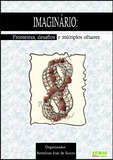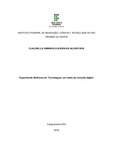| dc.creator | Oliveira, João Paulo de | |
| dc.date.accessioned | 2020-05-08T17:14:40Z | |
| dc.date.available | 2020-05-08T17:14:40Z | |
| dc.date.issued | 2015-07-08 | |
| dc.identifier.citation | OLIVEIRA, João Paulo de. Tecnologia social na educação profissional e tecnológica : perspectivas da formação do curso técnico integrado em informática do IFRN - Campus Mossoró. Orientadora: D.ra. Ilane Ferreira Cavalcante. 2015. 133 f. Dissertação (Mestrado em Educação Profissional) – Instituto Federal de Educação, Ciência e Tecnologia do Rio Grande do Norte. Programa de Pós Graduação em Educação Profissional, Natal, 2015. | pt_BR |
| dc.identifier.uri | http://memoria.ifrn.edu.br/handle/1044/1805 | |
| dc.description.abstract | The social function of educational institutions has been historically restricted to produce labor force in order to supply the job market and keep the social policy of ruling classes. This logic has found broad space at professional and technological education but in the new scenario of Rede Federal de Educação Profissional, Científica e Tecnológica, the Institutos Federais, emerged as the possibility of breaking with the previous model. So they bring to the local society the focus of their area of educational interest. As the result, the social function provides solutions to social problems. In this context, the Instituto Federal do Rio Grande do Norte (IFRN) intends to provide students with a professional and technological education articulated with science, culture, word and technology. In this articulation, we understand that the way how the technology is understood and as it is worked at Ensino Médio Integrado is crucial to achieve a model of transformative education, since the kinds of technologies can serve different interests. Among those interests we find social technology that aims to act in solving social problems. This technology is developed from the interaction between the local community and the school that must ensure the students the necessary training to do so. In this sense it, is possible to see that the principles of social technology are consistent with the social function of IFRN. Therefore, this dissertation aims to analyze the training of students at Curso Técnico Integrado em Informática as an improvement of the social function of IFRN - Campus Mossoró through social technology. In order to achieve these objectives, we have interacted with the authors who discuss the relationship between education and social changes; we have also analyzed the social function and the conception of technology that support IFRN pedagogical project (Projeto Politico Pedagógico – PPP – IFRN) and tried to understand the proposal of the pedagogical project of the course; and finally, we conducted a field study with students from this course in order to investigate whether the educational process of the students allow them to comprehend social technology as a tool of social transformation, and, therefore, as an instrument to strengthen the social function of IFRN. We have also realized that the institutional documents, PPC and PPP, present the necessary possibilities to strengthen the social function of IFRN through social technology. Referring to the education provided to the students, we have identified consistent characteristics of a transforming education as the inclusion of extension projects in the teaching practice, indicated by the students as the main link between the educational institution and society. In addition, we have identified, in the testimony of students that the comprehension of social technology as an important element of transformation, although the students did not have
opportunity to develope their formal principles during the formation process. According to the discussion and interpretation of the data collected during the field research presented, we have observed that the training provided to students includes the understanding of social technology as tool of transformation for the society and, therefore, contributes to the strengthening of IFRN social function. However, we do not have the intention to make the knowledge produced definite, but raise new references about the object studied. | pt_BR |
| dc.language | por | pt_BR |
| dc.publisher | Instituto Federal de Educação, Ciência e Tecnologia do Rio Grande do Norte | pt_BR |
| dc.rights | Acesso Aberto | pt_BR |
| dc.subject | Função social | pt_BR |
| dc.subject | Tecnologia social | pt_BR |
| dc.subject | Formação | pt_BR |
| dc.subject | Educação profissional e tecnológica | pt_BR |
| dc.subject | Social function | pt_BR |
| dc.subject | Social technology | pt_BR |
| dc.subject | Training | pt_BR |
| dc.subject | Professional education and technology | pt_BR |
| dc.title | Tecnologia social na educação profissional e tecnológica : perspectivas da formação do curso técnico integrado em informática do IFRN - Campus Mossoró | pt_BR |
| dc.type | Dissertação | pt_BR |
| dc.creator.ID | 0000-0002-6582-8402 | pt_BR |
| dc.creator.Lattes | http://lattes.cnpq.br/3111836146169990 | pt_BR |
| dc.contributor.advisor1 | Cavalcante, Ilane Ferreira | |
| dc.contributor.advisor1Lattes | http://lattes.cnpq.br/7082961004575723 | pt_BR |
| dc.contributor.referee1 | Cavalcante, Ilane Ferreira | |
| dc.contributor.referee2 | Medeiros Neta, Olívia Morais de | |
| dc.contributor.referee3 | Henrique, Ana Lúcia Sarmento | |
| dc.contributor.referee4 | Leite, Cicília Raquel Maia | |
| dc.contributor.referee5 | Carvalho Neto, Eulália Raquel Gusmão de | |
| dc.publisher.country | Brasil | pt_BR |
| dc.publisher.department | Natal - Central | pt_BR |
| dc.publisher.program | Mestrado Acadêmico em Educação Profissional | pt_BR |
| dc.publisher.program | Mestrado Acadêmico em Educação Profissional | pt_BR |
| dc.publisher.initials | IFRN | pt_BR |
| dc.description.resumo | Historicamente a função social das instituições educacionais se restringia a formar mão de obra para atender ao mercado de trabalho e assim manter o projeto societário da classe dominante. Essa lógica encontrou amplo espaço na Educação Profissional e Tecnológica, mas com a nova configuração da Rede Federal de Educação Profissional, Científica e Tecnológica, os Institutos Federais despontaram com a possibilidade de romper com esse modelo. Tendo como meta impulsionar o desenvolvimento local, eles trazem a sociedade para o centro do seu foco de atuação. Com isso, a sua função social desloca-se também para a resolução de problemas sociais. Nesse contexto, o Instituto Federal do Rio Grande do Norte (IFRN) busca proporcionar aos educandos uma educação profissional e tecnológica articulada com a ciência, a cultura, o trabalho e a tecnologia. Nessa articulação, entendemos que a forma como a tecnologia é compreendida e trabalhada no Ensino Médio Integrado é determinante para alcançarmos um modelo de educação transformadora, visto que os tipos de tecnologias podem servir a interesses diversos. Dentre eles, temos a tecnologia social que tem como objetivo atuar na solução de problemas sociais. Essa tecnologia é desenvolvida a partir da interação entre comunidade e instituição escolar, que deve garantir, ao educandos, a formação necessária para tal. Nesse sentido, constatamos que os princípios da tecnologia social se coadunam com a função social do IFRN. Para tanto, esta dissertação tem como objetivo investigar a formação dos alunos no curso Técnico Integrado em Informática no contexto do fortalecimento da função social do IFRN - Campus Mossoró por meio da tecnologia social. Para alcançá-lo, dialogamos com autores que discutem a relação entre educação e transformações sociais; realizamos a análise da função social e da concepção de tecnologia posta no Projeto Político Pedagógico (PPP) do IFRN; buscamos compreender a proposta de formação do Projeto Pedagógico do Curso; e, por fim, realizamos uma pesquisa de campo com alunos do referido curso, a fim de investigarmos se o processo de formação deles contemplou a compreensão da tecnologia social como ferramenta de transformação da sociedade e, portanto, de fortalecimento da função social do IFRN. Constatamos que os documentos institucionais (PPP e PPC) apresentam as possibilidades necessárias ao fortalecimento da função social do IFRN por meio da tecnologia social. Acerca da formação proporcionada aos alunos, identificamos características consistentes de uma educação transformadora, como a inserção na prática docente da realização de projetos de extensão, apontados pelos alunos como a principal ponte entre a Instituição e a sociedade. Além disso, identificamos, no depoimento dos alunos, a compreensão da tecnologia social como um
importante elemento de transformação, apesar de não terem conhecido seus princípios formais durante o itinerário formativo. Diante das discussões e interpretações dos dados recolhidos durante a pesquisa de campo apresentada, observamos que a formação proporcionada aos alunos contempla a compreensão da tecnologia social como ferramenta de transformação da sociedade e, portanto, contribui para o fortalecimento da função social do IFRN. Entretanto, não temos a pretensão de tornar o conhecimento produzido incontestável e acabado, mas suscitar a criação de novos referenciais sobre o objeto estudado. | pt_BR |







